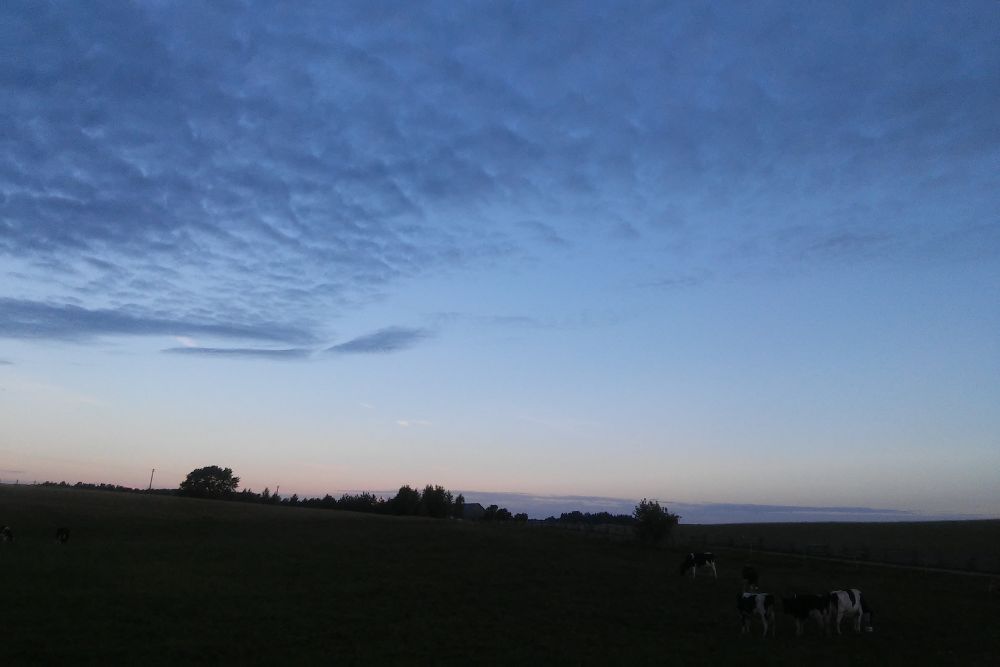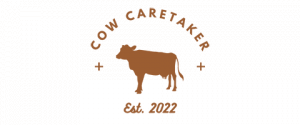Cows moo at night for various reasons that include: signaling a threat, separation from a herd or family, hunger, thirst and generally expressing their displeasure with something. Fictional reasons include a future death of a loved one and the answering of prayers.
Communication is vital to all animals, just as it is essential to us human beings. The variation comes in when different modes of communication are used to signal something.
In this case, we are talking about the auditory form of communication in cows, that is, mooing. In most cases, cows moo more frequently and their mooing tends to be noisier at night than during the day.
Table of Contents
Common Reasons Why Cows Moo At Night
1. To Signal A Threat
Cows, unlike humans, can pick up predator sounds because of their wide range of hearing. Cows are prey animals, so predator sounds pose a threat to the herd and will result in the cows mooing to warn each other of danger.
Over time, cows have evolved to use the smallest amount of light to be able to see at night. When they see or smell something scary in the dark – such as a predator sneaking up on their herd – they moo so that herd mates and farmers can take defensive action.
2. When Looking For Their Calves
Mother cows will moo loudly when looking for their lost calves if they ‘misplace’ them in the herd. The calf on hearing its mother’s call will moo back to respond.
Calves and their mothers can recognize each other’s call even in midst of large herds and the two form strong lasting bonds even after the mother cow has had subsequent calves.
When calves are separated from their mothers, such as for weaning, both the mother and the calf will moo at night as a way of signaling distress. The calves’ mooing can last about one week.
3. The Cows Are Lost
Cows are herd animals so when they venture out on their own away from the herd they will start mooing.
On going back to join the rest of the herd, the cows may lose direction resulting in their repeated mooing until the collective moo of their herd mates guides back the lost cows to the herd.
4. The Cows Are Hungry or Thirsty
Cows have a four-chamber stomach that needs to be filled constantly so they can never let it go when they experience hunger at night. They will moo or bellow to alert the farmer and will continue mooing until they’re fed.
Just like we human beings get up in the middle of the night to look for drinking water, cows also get thirsty at night mostly due to the heavy intake of their feeds. They will communicate this by mooing until they find a water source.
6. Injury Or Stress
When cows experience physical or emotional pain, they will moo in the middle of the night until they get a helping hand. Stress can also occur because of new surroundings especially when the cow is moved from one farm to another.
Grief also makes cows moo at night when an animal friend or a cow buddy has passed away or has been moved away from the herd. Other animals do establish strong bonds between them.
Stress makes cows moo at night when their spaces are limited and don’t have enough roaming space. This usually occurs when the cows are overcrowded in a pasture or if older cows have been placed in a small pen thus creating discomfort.
7. During Estrus Cycle and Temperature Changes
Estrus can occur anytime within 24 hours. When a cow experiences estrus (heat cycle) at night, it will moo to give a signal that it is ready for mating.
Cows are also sensitive to temperature change so they will moo at night when it’s too cold or hot.
Superstitious Reason Why Cows Moo At Night
Superstitious people claim that the death of someone in your inner circle is going to occur if a cow moos or bellow at night.
Other superstitious reasons include protection, contentment, answered prayers, and a sign of danger.

These reasons hold no scientific backing and shouldn’t scare you. We have already learned the genuine reasons why cows moo at night.
How To Minimize The Frequent Mooing Of Cows At Night?
There are numerous ways to keep your pastures a little quieter once the sun falls:
- Provide cows plenty of food and water. A well-fed cow is a happy cow, but just make sure you don’t overfeed them.
- Maintain a decent herd size. Cows are social animals and will become lonely and vulnerable to potential danger if separated from the rest of their herd. Any herd should have at least 5-10 cows as they feel safe in large numbers.
- Build strong fences to keep predators out. The fences should be built at a standard that keeps out predators like wild dogs which take advantage of the dark and lurk behind the shadows. An electric fence is often the best choice as dogs typically won’t try for a second pass-through.
- Include a livestock guard dog in the herd. Well-trained livestock guard dogs like an Anatolian Shepherd or the Great Pyrenees can protect your herd from predators like wild dogs and coyotes, and will naturally sleep in the pasture with your cows. Donkeys also make great guards and are famous for unwittingly protecting livestock by sensing predators and fighting them off by biting and kicking them.
- Address your injured or sick cows. Pain, stress, and discomfort make sick or injured cows moo if left together with the other cows in the herd. The affected cows can be removed from the herd and placed in a safe environment to receive proper care without disturbing the rest of the herd.
- Pay special attention to pregnant cows. Pregnant cows that are nearing the calving period should be put in a small enclosure in or near the barn for ease of access by the farmer, both day and night. This is because the pregnant cows are vulnerable and are easy prey to predators while in active labor as they can’t defend themselves. Newborn calves can also not run easily until several months old.
FAQs
How Do Cows Express Their Emotions?
Cows have varying vocalizations to express their emotions and they have distinct moos that express frustration, excitement, pleasure, and stress. The different moos and emotions also express anger and grief.
What Does A Cow In Distress Sound Like?
When a cow is in distress, it produces a much higher pitched ‘moo’ sound reserved for situations when they are upset.
What Do Cows Do At Night?
At night, it is common for cows to gather together in a herd because they have strong protection behavior.
Are Cows Active Or Scared At Night?
Just like most other domestic animals, cows tend to be more active during the day. Even so, cows are known to be rather active at night when they are hungry, stressed, or when they sense some form of potential danger.
Cows are known to graze pasture even into the dead of the night especially when it’s very hot for them to graze during the daytime.
Compared to humans, cows have developed a night vision defense mechanism that enables their eyes to control the amount of light that enters which is much better than we can. This, together with their oval-shaped pupils, allows them to see better at night than humans.
